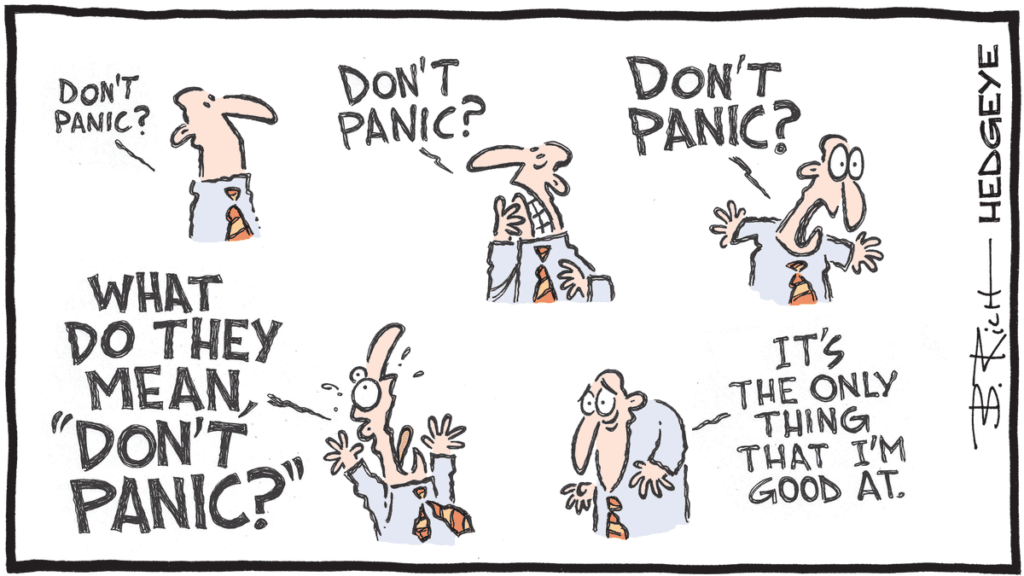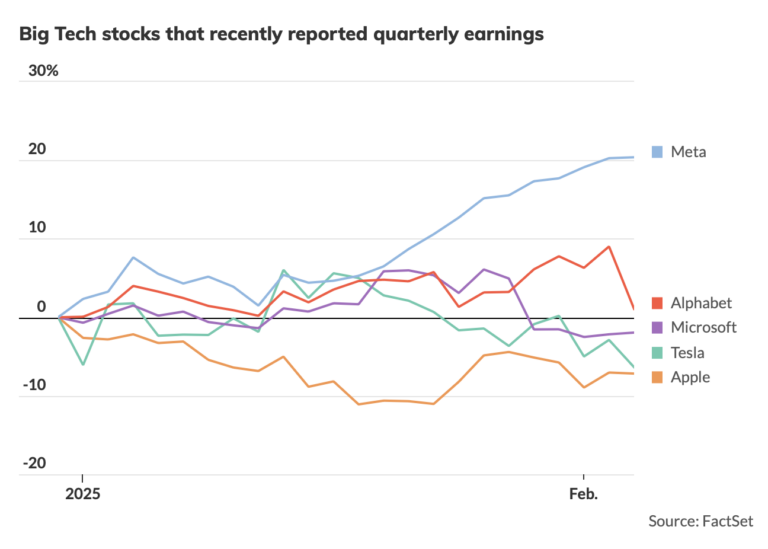
As we approach the end of this second week under Trump 2.0, if there’s one thing to take away, it’s that the market is showing an absolutely impressive level of resilience. I’m not sure whether to use the word resistance or resilience—either way, the relative strength of global markets is striking. After facing the DeepSeek attack on AI, followed by the aggressive tariff measures earlier this week, one might have expected far worse. Just yesterday, the “relatively” poor results from Google and AMD had put the market in a tricky position. But not at all—once again, investors managed to sort things out.
Tariffs Still Weigh on Europe
As we approach the end of this second week under Trump 2.0, one thing is clear: the market is demonstrating an absolutely impressive level of resilience. I don’t know if we should use the word “resistance” or “resilience”—either way, the relative strength of global markets is striking. After enduring DeepSeek’s attack on AI, followed by the vicious tariff assault earlier this week, we could have expected much worse. Just yesterday, the “relatively” poor earnings reports from Google and AMD put the market in a tough spot. But no—investors managed to sift through the data once again.
When looking at where indices closed yesterday, the picture is quite encouraging, considering the fears still looming over us—fears that will last for another 3 years, 11 months, and two weeks. We’ve understood that as long as Trump is in office, we will live under the constant threat of him getting angry about something. And right now, he is very, very angry. But despite these tensions, as well as the “bad numbers” from some major companies that make up a large portion of U.S. indices, things went relatively well yesterday.
However, Europe closed slightly in the red, particularly in France and Germany, as both European heavyweights remain wary of what the U.S. president might unleash next regarding tariffs. Based on what he announced for Canada, Mexico, and China, it seems likely he’ll wait until markets close on Friday evening before making a move on the issue.
Europe mostly traded in the red, reflecting concerns over a potential American reaction. Additionally, Pernod Ricard expressed pessimism about its future outlook, stating that the economic, political, and geopolitical situation was too complicated to make any solid predictions. The spirits company has therefore decided to “navigate by sight and hope for the best.” Their gloomy comments, which gave the impression that management was in full burnout mode, weighed heavily on the stock, making it the biggest loser in the CAC 40 yesterday. But once again, the central question for European markets remains: “What is the orange man going to do next?” And more importantly, “How will our so-called leaders respond, given that they currently seem about as trustworthy as a group of drug dealers awaiting a shipment at a highway rest stop in southern France?”
But Wait, There’s More…
In short, Europe saw a slight decline, questioning what the next “Made in the White House” event would bring. Meanwhile, Valneva soared after announcing that the UK’s Medicines and Healthcare products Regulatory Agency (MHRA) had approved its iXchiq vaccine—the world’s first vaccine against chikungunya. This marks its fourth approval, following Europe, Canada, and the U.S. The stock jumped 17%.
And once again, I find myself wondering: why do scientists insist on giving vaccines such ridiculous names? In this case, “IXCHIQ”—six letters, only two vowels (which are the same), and four consonants, including a “Q” and an “X”! Seriously? Just trying to pronounce the vaccine’s name makes you feel worse than being bitten by a mosquito carrying chikungunya. They could have simply called it “the world’s most effective chikungunya vaccine” and saved us all some trouble. Okay, sure, it wouldn’t score as many points in Scrabble, but at least it would be pronounceable.
Elsewhere, TotalEnergies reported a 21% drop in profits for 2024. The company stated that market conditions were “less favorable” than in 2023. However, this bad news was already priced in, as the stock had fallen 30% from last year’s highs. The company forecasts oil at $70 per barrel in 2025, will continue investing in renewables, and wants to get listed in New York—without offending France. We’ll see how that works out.
TotalEnergies’ CEO also joined Bernard Arnault in saying that investing and growing a business in France is nearly impossible under the current tax and economic policies. Of course, that’s not exactly how he phrased it, but the message was clear. What’s interesting is that whenever Total posts record profits, the left-wing crowd gathers outside their headquarters, screaming for the CEO’s head because he isn’t handing out free money to every French citizen. But when profits are down—poof! Silence. Strange, isn’t it?
MAGA Mode Activated
Meanwhile, in the U.S., the conversation was quite different. The tariff issue was already forgotten. Investors have realized that Trump is using tariffs as a weapon of mass destruction to force trade partners into quicker negotiations—far more effective than hosting luxurious summits in five-star hotels where rooms cost $1,500 a night for a 24-square-meter room with a pool view.
So, instead of worrying about tariffs, the focus shifted to economic data and earnings reports. Yesterday, we got the first U.S. employment report under Trump 2.0—the ADP report. Now, we all know these numbers are basically meaningless because what really matters is the Non-Farm Payrolls report coming on Friday. But since yesterday’s ADP data showed strong job growth, it caught investors’ attention anyway.
According to the report, the private sector added 183,000 jobs in January. December’s numbers were also revised up, from 122,000 to 176,000. In short, better than expected, plus an upward revision.
Funny how that’s the exact opposite of what happened under Biden. Not saying there are two different calculation methods at play here, but… let’s just say I’m leaving that thought unfinished.
This stronger-than-expected job data immediately raised doubts about whether the Federal Reserve will cut rates anytime soon. Right now, the probability of a rate cut in March is at 16%. Thankfully, the bond market was more focused on the U.S. Treasury’s announcement that it won’t increase debt issuance in the coming months.

Earnings and More Earnings
Aside from that, the focus was on managing Google’s decline, which weighed heavily on the Magnificent Seven and the indices. But Eureka! Something magical happened: investors saw a silver lining in Google’s “disappointments”—the massive investments announced in AI. Of course, these investments are bound to benefit Nvidia. The rise of the AI king somewhat offset Google’s and AMD’s poor performances.
Beyond that, the focus remained on quarterly earnings. Among yesterday’s long list of announcements, UBER stood out with revenue exceeding expectations, reporting a net profit of $6.88 billion compared to $1.43 billion a year ago. However, they admitted that “its profits were mainly due to exceptional items,” which disappointed analysts. Concerns also arose over the emergence of robotaxis, which Musk has been promising every three months. As a result, Uber lost over 7% yesterday.
At Disney, results exceeded expectations across the board, yet the stock fell 2.4% during the session. As always, digging deeper into the numbers was necessary—sellers pounced on Mickey due to a decline in Disney+ subscribers (which is understandable given the originality of their content). In short, earnings were strong, but the market remains fixated on streaming subscribers.
Meanwhile, MicroStrategy reported its fourth consecutive quarterly loss, mainly due to an impairment charge on its cryptocurrency holdings. They also announced raising another $600 million to buy more Bitcoin and are even changing their name to “Strategy,” with a “B” logo to highlight their business model. MSTR fell over 3% after hours, while Bitcoin stands at $97,900.
Beyond That
After the closing bell, Ford reported earnings that beat expectations but warned that 2025 won’t be smooth sailing. Their electric vehicle strategy will weigh on costs and investments, making things challenging. They sounded almost as enthusiastic as Pernod Ricard’s management. Ford shares dropped 4.5%. They also expressed concerns about potential tariff policies that could hurt them.
At 10 PM last night, Qualcomm posted better-than-expected earnings but is struggling with Apple’s gradual reduction in semiconductor purchases from them. The stock fell 4.5% in after-hours trading. ARM Holdings also reported solid earnings, but its optimistic guidance wasn’t optimistic enough for investors, causing the stock to drop over 7% after hours.
This Morning
Asian markets can be summed up as follows: “Optimism around AI is driving gains, but fears of a US-China trade war are limiting the upside.” The Nikkei is up 0.5%, the Hang Seng is up 0.7%, and China’s market is up 0.95%. Gold is at $2,888, and oil, also pressured by tensions with China, is trading around $71. Oil inventories came in higher than expected, adding pressure on crude prices. One expert noted yesterday that the inventory build-up is mainly due to weak seasonal demand, as refineries are entering their annual maintenance period before spring arrives. Yes, you read that right—spring is coming back!
Today’s Agenda
US Treasury Secretary Scott Bessent stated that Trump doesn’t want to pressure the Fed to cut rates but wants lower yields on Treasury bonds. It’s reassuring to know he won’t be holding Powell at gunpoint to make a move.
On the ECB front, a key piece of information on interest rate policy in the eurozone is coming soon. On Friday, new estimates of the neutral rate will be published. (The neutral rate is a theoretical level that neither overheats nor slows down the economy—it’s the holy grail every central banker dreams of finding.) Christine Lagarde stated that she and her colleagues will “work based on this document” to determine “what the ECB’s monetary policy direction should be.” In short, we should soon get more clarity on the central bank’s rate-cut plans.
Today’s Earnings
Today, we’ll get Eli Lilly’s earnings, following Novo Nordisk’s report yesterday, which reassured investors about the future. Later in the evening, Amazon will report after the close. This is the second-to-last Magnificent Seven company to report before Nvidia on February 26, followed by Broadcom—the final BATMAN stock—on February 28.
In France, this morning’s focus is on L’Oreal and Societe Génerale. SocGen has already reported, announcing that its profit doubled to €1.04 billion and unveiling a €872 million share buyback plan. Apparently, retail banking is doing quite well at the moment.
Now, we just have to wait for the US Jobless Claims data and Germany’s Factory Orders. Tomorrow brings the NFP report, which should be very interesting—unless Trump decides to stir things up in Europe to distract from the numbers.
For now, futures are up 0.24%, bringing the S&P 500 ever closer to record highs despite a mediocre earnings season for the Big Tech names, as the chart below illustrates.

For the rest, I just have to wish you a wonderful day, and we’ll meet again tomorrow at the same time and place. Stay strong, and don’t get too caught up in the deafening noise of financial media—trust your opinions and instincts. Sometimes, that’s not such a bad thing, and you’ll quickly realize that you shouldn’t listen to just anyone. The guy sitting across from you at the bar has his own opinion, and it’s not necessarily better (or worse) than a Wall Street star’s. And most importantly, you’re not necessarily wrong…
Have a great day, everyone!

